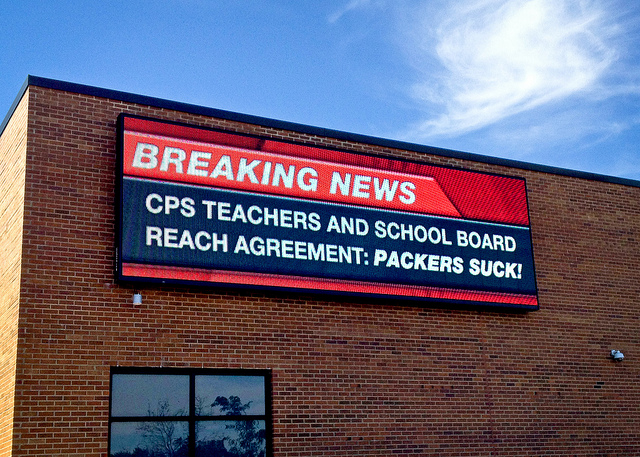Schools Back In Session As Chicago Teachers Move To Ratify New Deal
By Chuck Sudo in News on Sep 19, 2012 3:15PM
With the first Chicago teachers’ strike in 25 years now over and kids across the city back in class this morning, the Chicago Teachers Union rank-and-file now must get to the business of ratifying the new deal the union’s bargaining committee negotiated with the Chicago School Board.
The union’s Tuesday vote to call off the strike came not a moment too soon. A Cook County Circuit Court judge was to hear the city’s request for an injunction to force the teachers back to work. There was also the looming possibility that public support of the strike could have shifted in favor of Mayor Rahm Emanuel and Chicago Public Schools after the union’s House of Delegates failed to vote on the deal Sunday. CTU President Karen Lewis said there would be no further negotiating and that both sides won and lost concessions in the contract. Chicago Sun-Times columnist Mary Mitchell wrote in a Tuesday column it was time for Lewis to shift the rhetoric toward reconciliation.
For months, teachers have been told they have been “belittled, betrayed, bullied” by the school board and the mayor’s administration. Of course, they aren’t happy to end up with a 3 percent raise in the first year and a longer school day. But for union delegates to refuse to suspend the strike makes the union chief look like she’s not leading. After all, it was on Lewis to put out the fire and let healing begin.
The Sunday non-vote was a rare misstep for Lewis in what was a strong campaign to paint the school district as untrustworthy, dating back to the School Board’s June 2011 decision use a “reasonable expectations” clause to rescind a promised 4 percent pay raise to teachers. Lewis now comes out of the strike as a major player in labor and education issues in Chicago and Illinois. Lewis’s strategy and her not backing down to Emanuel was the first major defeat to Emanuel in his mayoralty and may serve to embolden other unions like the police and fire unions. Both of those unions are working without a contract and, while they are prohibited from striking under state law, the teachers union strike may give them some leverage in future negotiations with the city on new deals.
The Sun-Times also credited School Board President David Vitale’s late entry into the negotiations with helping to break what had become a stalemate in negotiations between the two sides, prompting many observers to ask why he didn’t step in sooner. The missing-in-action CPS CEO Jean-Claude Brizard can now be considered a lame duck for his inability to broker a deal. It isn’t a question of if Brizard will be fired or tender his resignation, but when.
The teachers union won some major concessions in the deal including:
- A freeze on health care premiums and copays for members in exchange for participating in a wellness program.
- The ability to cash out up to 40 unused sick days in their pensions
- Year-round and traditional school calendars merged into one across the entire district.
- A “no stakes” policy for tenured teachers in the first year of the deal and an appeals process for teachers with bad performance evaluations.
Emanuel called the new agreement an “honest compromise” for including a longer school day and 30 percent of teacher evaluations based on standardized testing. Not all of Emanuel’s allies are satisfied, however.
Venture capitalist and Emanuel adviser Bruce Rauner, an advocate of more charter schools in Chicago, blasted the agreement and the teachers’ union.
"Wherever we come out on it, the good news long term, the taxpayers are frustrated in this city and they're beginning to push back and very importantly, the parents are awakening to the issues in the city and I think we're going to have a multiyear revolution," he told an audience of business and political leaders at a seminar held jointly by the Dallas-based President George W. Bush Institute and the right-leaning Illinois Policy Institute."The critical issue is to separate the union from the teachers. They're not the same thing," Rauner said. "The union basically is a bunch of politicians elected to do certain things — get more pay, get more benefits, less work hours, more job security. That's what they're paid to do. They're not about the students. They're not about results. They're not about the taxpayers."
Apparently Rauner hadn’t seen the polls showing a majority of registered voters siding with CTU in the strike.
Rauner continued:
"The good teachers know they'll do fine. They've got the confidence. I've talked to them. I know. It's the weak teachers. It's the lousy, ineffective, lazy teachers that — unfortunately there are a number of those — they're the ones that the union is protecting and that's where there's a conflict of interest between the good teachers and the union bosses.
